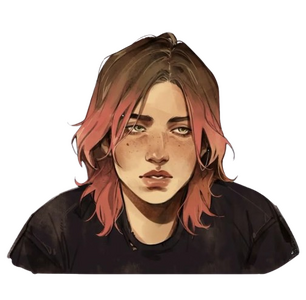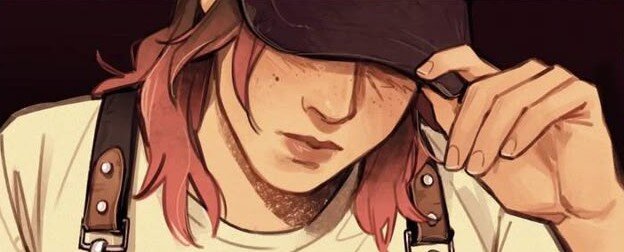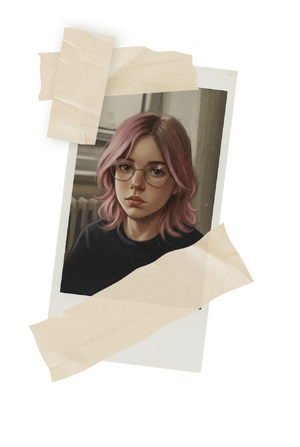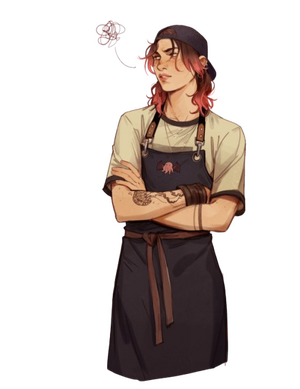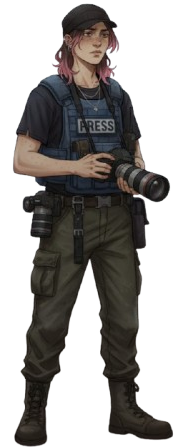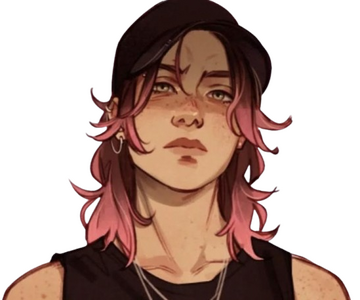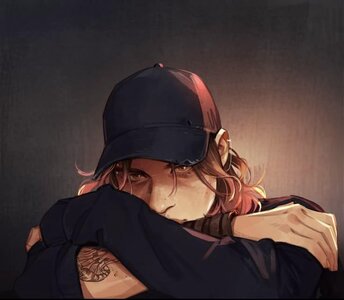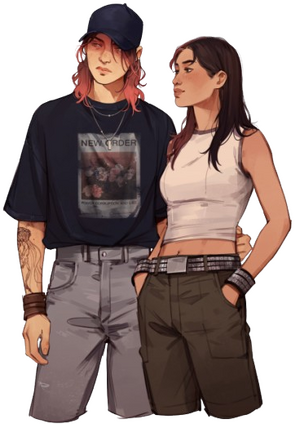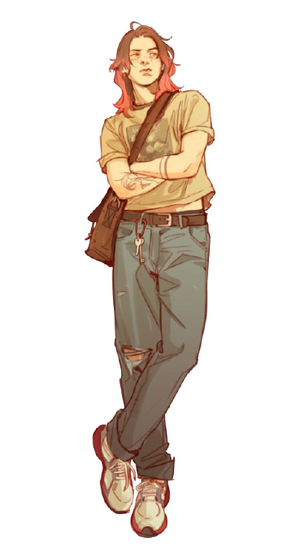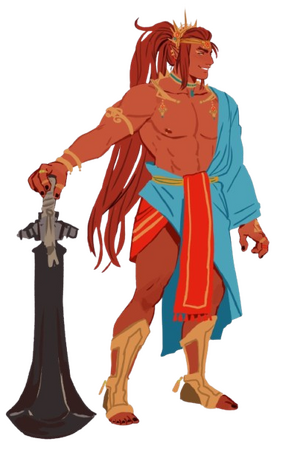 Work in Progress
Work in Progress  BASIC INFORMATION
BASIC INFORMATION
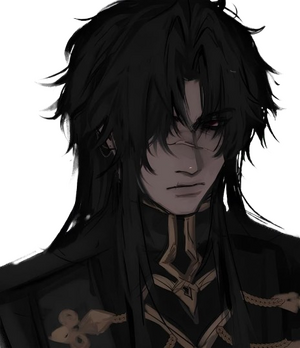 NAME
NAME → Kieran Blackmane
NICKNAMES → Kier (close family only) / The Last Hound (what other clans call him when they think he can't hear)
AGE → 28
BIRTHDATE → xxxx/11/03
GENDER → Male (he/him)
HEIGHT/WEIGHT → 6'2" (188 cm) / 195 lbs (88 kg)
SEXUAL ORIENTATION → Heterosexual
OCCUPATION → Witch Hunter / Blackmane Clan Enforcer (only active redmarked member)
PERSONALITY DESCRIPTION
Kieran knows what he is. A weapon. He's not bitter about it, doesn't rage against the unfairness of being shaped into something with a single purpose. It's just fact. From the moment his eyes bled red at thirteen, his path narrowed to a single line, and he's walked it without complaint ever since. Some people might call him cold, but cold implies a lack of feeling. Kieran feels plenty. He just keeps it controlled, locked down, because letting emotions run wild makes the beast harder to manage, and managing the beast is the difference between functional and monstrous.
His loyalty doesn't attach itself to people the way it does for others. It fixes on function instead, on purpose, on the job that needs doing. He's learned to work with the beast inside him through practical cooperation rather than the brutal suppression most redmarked attempt. They've reached an understanding, him and the thing that shares his skin. It wants to hunt, to fight, to run. He gives it those things when he can. In return, it lends him its strength without trying to devour what's left of his humanity.
Being the last active redmarked Blackmane carries weight. He's irreplaceable, and everyone knows it. But Kieran doesn't spend time thinking about the pressure, about what happens if he breaks like the others did. He just keeps going. Keeps hunting. Keeps crossing into a world that actively rejects his existence because that's what he was made for. Duty isn't some noble burden he carries. It's the framework holding him together. Take away the mission and there's not much left.
BACKGROUND
Early Life
Kieran was born into the Blackmane Clan when the old blood had already started thinning. His mother, Rheva, sat on the Council of Mothers - stern, practical, devoted to the clan above everything else. His father was a capable warrior but not redmarked, and Kieran barely remembers him beyond a vague presence in his childhood.
What he remembers clearly is Mira.
His older sister was six years ahead of him and already marked when Kieran was still young enough to think it made her special rather than cursed. Her eyes bled red at twelve, and she became everything the clan valued. Strong, fearless, efficient. She protected Kieran, taught him to fight, and when his own eyes turned red at thirteen, she was the one who kept him from falling apart during those first brutal transformations.
"The beast isn't your enemy, Kier," she told him while he shook with the effort of keeping it contained. "It's part of you. Work with it, not against it, and you'll survive this."
She was right. While other young redmarked destroyed themselves trying to suppress the beast or dominate it into silence, Mira taught Kieran a different approach. Acknowledge it. Respect what it wants. Give it what it needs when possible. In return, it lends you its strength instead of fighting for control. It wasn't harmony - nothing about being redmarked is harmonious - but it was functional, and functional meant alive.
Training and Purpose
The Blackmane Clan had been hunting witch bloodlines for seven generations. The theory was simple: kill all the witches whose ancestors created the banishment curse, and werewolves could exist in the human world again. Whether the theory was correct didn't matter much anymore. Too many had died chasing it to turn back now.
Redmarked Blackmanes were the only ones capable of crossing into the human world to do the hunting. The curse that kept other werewolves out couldn't stop them completely, though it made them suffer for the intrusion. Physical pain, mental strain, the beast screaming constantly to leave. Every second in the human world cost something.
Kieran trained for it from the moment his eyes changed. Combat, tracking, killing, endurance work. They'd force him to stay in the human world until he was shaking and nauseous just to build his tolerance. His mother oversaw most of his training personally, never giving him softer treatment because he was her son. Mira went on missions and came back with lessons, sometimes with scars, always with that look that said she'd seen something she couldn't unsee.
An older redmarked named Garren took over Kieran's training once he started active missions at sixteen. Garren was in his forties, weathered by decades of crossing over, but still the best hunter the clan had. He taught Kieran the practical side - how to track witches through human cities, how to kill efficiently, how to manage the beast when everything in the human world was making it scream.
"The human world's going to try breaking you," Garren said, voice flat with certainty. "The pain, the wrongness, the way even the air feels like it's pushing you out. It makes the beast loud. Makes it want to transform, want to run home. You can't let it. Make it understand - we finish the job first. Then we leave."
First Blood
Kieran's first solo witch hunt at sixteen almost killed him. The Council decided he was ready after three years of training and dozens of missions as support. The target was a young witch living alone in Manchester. Should have been straightforward.
Everything went wrong.
The witch had wards he didn't detect. They triggered the moment he entered, sending pain through his nervous system. The beast panicked, tried to force a transformation. Kieran barely held it back. The witch fought hard, terrified but desperate to survive. His training was solid but this was different - real, messy, chaotic.
She caught him across the palm with a kitchen knife. The scar is still there. The pain snapped something into focus. The beast surged forward, not to transform but to help. Suddenly he wasn't thinking, just moving on instinct. The fight ended quickly after that.
He stood over her body afterward, hand bleeding, shaking from adrenaline and the aftermath of nearly losing control. The beast was screaming to leave. But he forced himself to stay, to search her apartment for information, to complete the mission properly.
When he reported to the Council, his mother looked at the blood on his clothes and the crude bandage on his hand. "Complete?"
"Yes."
"Good. Clean yourself up. We'll hear the full account in an hour"
No congratulations. No comfort. Just acknowledgment that he'd done the job. That was when Kieran understood what his life looked like now. This was his function. This was everything.
That night he opened the small leather journal he'd bought before the mission and wrote the first entry. First name on what would eventually become a very long list.
Learning Control
At twenty-one, Kieran made his biggest mistake - taking a mission during a full moon. Five years into hunting by then, confident in his control, convinced he could handle the extra strain. The Council approved it because they needed a specific target eliminated.
The kill went fine. Then the full moon rose while he was still in the human world.
The beast, which had been cooperative, suddenly became overwhelming. The full moon amplified everything - the pain, the desperation to transform, the feeling of wrongness. His control started slipping.
He made it to an extraction point but couldn't cross back. The beast was too loud. If he tried shifting forms to pass through the barrier, he might not stop the transformation. Might go fully monstrous.
Six hours. He spent six hours in an abandoned warehouse, locked in internal battle with the beast. Every moment it got louder. Transform. Run. Leave.
Kieran didn't try suppressing it. He talked to it. Not with words, but with intention, with understanding.
"I know. This place hurts. I know you want to leave. I want to leave too. But if you take over, if you transform here, we become like Garren did. Someone will have to kill us. I don't want to die. You don't want to die either. We survive this together, or we don't survive at all."
The beast didn't calm down. But it listened. For the first time since his eyes turned red, Kieran felt like they were actually communicating instead of just fighting for control.
When the moon finally set enough for the pressure to ease, he crossed back over. Went straight to his quarters and didn't come out for two days. The Council noted the delay but didn't question it. Target was dead. Mission complete.
Mira found him on the third day. "Full moon?"
"Yeah."
"You held?"
"Barely."
She sat with him in silence for a while. Then: "You're stronger than you think, Kier. But don't test it like that again. The beast isn't something you beat. It's something you survive."
Kieran never took missions during full moons again unless absolutely critical. That night taught him where his limits actually were.
Loss of Garren
When Kieran was nineteen, Garren went on a routine mission and didn't come back on schedule. The Council sent Kieran to find him.
Three days of tracking led to an abandoned factory outside Manchester. Kieran found what was left of Garren there. Fully monstrous. That nightmare transformation where the beast wins so completely that the human consciousness just stops existing. Garren had decades of experience, had survived hundreds of crossings, and it still wasn't enough.
Kieran tried once. "Garren. It's Kieran. Come back."
Nothing. Just the beast looking out through red eyes that didn't recognize him anymore.
The fight was brutal. Garren had taught Kieran everything, which meant Kieran had to use all of it just to survive. When it ended, he stood over his mentor's body and understood something fundamental about being redmarked. Even the best break eventually. Even decades of experience won't save you. They're all on borrowed time.
He brought the body home. The Council listened to his report. "He was gone," Kieran told them. "I ended it."
His mother nodded once. "You did what was necessary."
Kieran grieved. He acknowledged the loss, honored what the man had taught him, participated in the funeral rites. Then he moved on. The lesson was too clear to ignore - maintain control always, because losing it means death.
The Quiet Kill
Not every witch hunt was violent. Some were just sad.
At twenty-four, Kieran was sent to Dublin to eliminate a witch who worked as a librarian. She had minimal magical ability, barely registered as a witch. But she was part of the bloodline, and the Council's orders were absolute.
He tracked her for three days, then entered her apartment while she was at work. While he waited, he looked around. Books everywhere. Half-finished jigsaw puzzle. Photos with friends. A cat hiding under the bed. Evidence of a quiet, harmless life.
When she came home, she saw him immediately. Didn't scream. Just went very still.
"You're here for me."
"Yes."
"Because of my family name."
"Yes."
She was quiet for a moment. "I barely have any magic. Never hurt anyone. Didn't even know about the curse until my brother told me before he disappeared. I'm guessing you killed him too."
"Three months ago. Edinburgh."
She nodded slowly, sat down in her armchair like her legs wouldn't hold her. "Will it hurt?"
"No."
"That's kind of you." She looked at her cat. "Will you take Morrigan to the shelter after? She's friendly, someone will adopt her."
Kieran hadn't expected that. "Yes."
"Thank you."
She closed her eyes. Kieran made it quick.
Afterward, he sat in that apartment longer than he should have. The cat came and sat near him. He'd killed forty-one people by that point. This was the first one who'd thanked him for doing it.
He took the cat to a shelter before leaving Dublin, like he'd promised. When he crossed back over, his mother asked for the mission report. "Target eliminated," he said. Didn't mention the conversation. Didn't mention the cat.
But he still thinks about her sometimes. Wonders if accepting death with that kind of grace was strength he doesn't have. Wonders what his life would look like if he were free to just exist quietly the way she had. Wonders if the cat found a good home.
Mira's Final Days
Three days before Mira left for her last mission, she found Kieran training in the clan grounds. She watched him work through combat forms before speaking.
"You ever think about what comes after?"
Kieran paused. "After what?"
"After the curse breaks. After the last witch is dead. After the mission is complete."
"No."
Mira smiled, but it looked sad. "Yeah. Me neither. Used to, when I was younger. Thought maybe I'd travel, see the parts of the human world that don't hurt to exist in. Maybe find a mate, have kids, live something like a normal life." She sat down, gestured for him to join her. "But that's not going to happen."
"You don't know that."
"I do, Kier. I've been doing this for fifteen years. I'm tired in a way sleep doesn't fix. The beast is getting harder to work with. Sometimes I hear it even when I'm here, safe in our realm, just whispering in the back of my head. Wanting things I can't give it anymore."
Kieran didn't say anything. He could see it - the way she moved now with slight hesitation, the way her eyes stayed red more often even when she was home.
"You're better at this than I am," Mira continued. "You figured out how to coexist with the beast faster. More efficient, more controlled. You're going to outlast me by years."
"Mira, don't-"
"Listen." She turned to face him fully. "When I break, and I will, you can't hesitate. You understand? When the beast wins completely, the person is gone. All that's left is something wearing their face. You put it down fast and clean."
"I know."
"And you don't feel guilty about it after. The me that you know, the sister who taught you to fight, who helped you through your first transformation? That person will already be dead before you find me. You'll just be cleaning up what's left."
Kieran met her eyes. Red looking at red. "I understand."
"Good." She stood up, stretched. "One more thing. When you write my name in your journal, because I know you keep that list, don't put how I died. Just that I died on mission. Let the clan remember me as functional, not as something that had to be put down."
"The journal is just for me. No one else sees it."
"Then let you remember me as functional."
Three days later she left for Prague. Four days after that, the Council sent Kieran to end what she'd become.
Loss of Mira
The Council called him in. His grandmother Saskia delivered the news. "Your sister has lost control. She's in the human world. Fully gone. You need to bring her back, or end her."
His mother stood beside Saskia, silent. Her face was stone.
"She's my sister," Kieran said.
"She's gone," Saskia said firmly. "You know what monstrous means. You saw it with Garren. There's no bringing them back."
He knew. Once the beast wins completely, the human side isn't fighting to resurface. It's just gone.
Finding Mira was easy. She'd left a trail of destruction. Facing her was harder. She'd been his protector, his teacher. Looking at her now - massive, wrong, glowing with that horrible red light - felt like looking at a desecration.
He tried once. "Mira. It's Kier."
For just a second, her eyes focused on him. He thought, maybe-
Then the beast surged and she attacked.
The fight was worse than Garren because Kieran kept pulling his strikes, kept trying to subdue instead of kill, kept hoping she'd come back. She nearly killed him twice. Finally he made the choice. His sister was already dead. What remained was just the beast wearing her body.
He chose mercy.
Bringing her body home broke something in his mother that he'd never seen break before. The Council of Mothers stood in grim silence. Mira had been destined for leadership eventually, a woman with the redmark, the rarest and most valuable combination. Now she was gone. Now Kieran was the last active redmarked Blackmane left.
His mother didn't blame him. She seemed proud that he'd been strong enough to do it, even while grief tore her apart.
The clan held funeral rites. Kieran participated, said the proper words, burned the traditional offerings. He mourned genuinely. Mira had been important to him. But mourning doesn't change reality. She'd lost control. He'd ended it. Those were just facts.
After Mira's death, Kieran's focus on control became absolute. If his sister could break - and she was better than him in every measurable way - then he absolutely could too. So he maintained his cooperation with the beast like his life depended on it. Because it did.
He also became aware that he was now the last weapon the clan had. There were older redmarked Blackmanes still alive, but age and damage had worn them down past usefulness. Kieran was it. Twenty-five years old and irreplaceable.
The Council's Charge
After Mira's death, the Council called Kieran to formal meeting. All seven Mothers present. His mother and grandmother among them.
Saskia spoke for the Council. "You understand your position."
"I'm the only one left who can cross over."
"Yes. The older redmarked are beyond active service. No new redmarked have manifested in the younger generation. You are singular."
His mother continued. "We've been hunting the witch bloodlines for seven generations. We're close to the end. Based on our information, there are only a few families left."
"You want all of them dead."
"We want the curse broken," Saskia corrected. "The witches' ancestors banished all werewolves from the human world. We've operated on the theory that eliminating the witch bloodlines responsible will break that curse. We need to know if the theory is correct."
Another Mother leaned forward. Vera, old and scarred from her own time as a warrior. "We're asking you to complete what seven generations of redmarked have worked toward. Asking you to finish this."
Kieran looked around the Council chamber. Seven women watching him with varying expressions. Expectation. Hope. Resignation.
"And if it doesn't work?" he asked. "If I kill them all and the curse remains?"
Silence stretched out.
Finally, Saskia spoke. "Then we'll know for certain. And we'll find another way. But we have to eliminate all possibilities first."
"How long do I have?"
"As long as you need. But Kieran-" His mother's voice carried weight now. "We know the cost of what we're asking. We've watched Garren break. We've watched Mira break. We know you're walking the same path."
"I can handle it."
"For now," Rheva said quietly. "But this is likely your last mission series. After this, even if you survive it, you'll probably be too compromised for further active service. We're burning you out to finish this. You understand that?"
Kieran understood. They were spending their last functional weapon to complete a mission generations in the making. Once he was done, or once he broke, there would be no more witch hunting unless new redmarked manifested.
"I understand."
Saskia stood. "Then we give you this charge: End the witch bloodlines. Break the curse. Come home when it's finished."
Current Status
Over the past two years, Kieran has been systematically working through the remaining witch families. He's killed dozens. Added dozens of names to his journal. He's getting close to the end now. Close to finding out if seven generations of sacrifice and suffering actually meant something.
He knows he's on borrowed time. Garren lasted until his forties. Mira made it to thirty-four. Kieran is twenty-eight and has been doing this for twelve years. Best case scenario, he's got maybe five more years before the accumulated damage breaks him.
He doesn't think about it much. Just another fact to file away and ignore until it's relevant.
The Council is waiting for him to complete the mission. His mother is waiting. His grandmother is waiting. Everyone who died getting the Blackmanes this far is waiting.
Kieran just keeps going. Keeps hunting. Keeps crossing into a world that rejects him. Because that's what weapons do. They function until they break.
LIST OF SKILLS
→ Witch Hunting → Twelve years of tracking and killing witches makes Kieran one of the most effective hunters the Blackmanes have ever produced. He knows how to identify their magic, how their defenses work, where they hide, how they think. More importantly, he knows how to kill them efficiently and get out before anyone notices. It's not pride. Just accumulated experience.
→ Combat Mastery → The clan's been training him to fight since he was old enough to throw a punch. Hand-to-hand, bladed weapons, improvised weapons, fighting dirty when necessary. He's killed other werewolves, witches, and things most Blackmanes never encounter. His style is practical rather than elegant. Brutal when it needs to be. The goal is always to end it fast.
→ Beast Cooperation → Most redmarked spend their lives trying to suppress the beast or dominate it into submission. Kieran works with his instead. He understands what it wants, what it needs, how to negotiate when their goals don't align. This makes his transformations smoother and his control more stable than most. The beast lends him strength, instinct, heightened senses. In return, he gives it the hunt. It's not friendship. It's functional partnership.
→ Pain Tolerance → Twelve years of crossing into the human world builds tolerance the hard way. The human world rejects werewolves on a fundamental level. Existing there is constant low-grade agony that gets worse the longer you stay. Kieran can function through pain that would drop other wolves because he's had to. Because the alternative is failing the mission, and failure isn't an option.
→ Tracking → Even in human form, his senses are sharper than they should be. Add years of training and the beast's instincts feeding him information, and Kieran can track someone through a crowded city or empty wilderness with equal efficiency. He picks up on scents other people miss, patterns in behavior, the small details that reveal where someone's going or where they've been.
→ Human World Navigation → Twelve years of missions means he knows how to move through human society without drawing attention. Understands their technology well enough to use it. Knows their social customs well enough to blend in. Can pass as human for extended periods when necessary, though it's exhausting in ways that have nothing to do with the physical pain of being there.
→ Crisis Management → Things go wrong. Plans fall apart. Targets fight back harder than expected. Kieran's gotten good at handling situations as they deteriorate. Emergency first aid. Extraction under pressure. Reading when a situation's about to go catastrophically sideways. Improvising when the original plan is dead and burning. All learned through trial and error, mostly error.
→ Intimidation → There's something about Kieran that makes people instinctively wary. Maybe the red eyes. Maybe the way he moves, too controlled, like violence on a leash. Maybe just the aura of someone who's very good at killing and doesn't particularly care about doing it. He can use this when he needs to, though he doesn't enjoy it. It's just another tool.
→ Interrogation → Sometimes you need information before you kill the target. Kieran knows how to extract it. Not through torture - too messy, too unreliable, too time-consuming. Through reading people instead. Understanding what they're afraid of, what they want, what they'll trade information for. Most people will talk if you ask the right questions in the right way.
→ Magical Awareness → Twelve years hunting witches teaches you to recognize magic when you encounter it. Kieran can't use magic himself, but he knows the signs. The feeling of it in the air. The way reality bends slightly around active spells. How to identify what kind of magic someone's using and roughly how dangerous it is. It's saved his life more than once.
TRIVIA
→ His eyes aren't always red. Normally they're dark amber-brown, almost ordinary. The red bleeds through when he's emotional, when the beast is close to the surface, when he's in pain. In the human world they're red more often than not because existing there hurts constantly and pain brings the beast closer. Other Blackmanes can tell how much he's struggling by how red his eyes are running. He's learned to hide most signs of strain, but the eyes give him away.
→ Keeps a small leather journal where he records every witch kill. Name, date, location, method. Not pride. Not guilt either. Just documentation. Proof that the mission is progressing. He's killed forty-three witches over twelve years. The list keeps growing.
→ Three scars matter more than the others. One across his ribs from Garren's claws when he was fighting to put him down. One on his shoulder from Mira's teeth during their fight. One across his palm from his first solo witch hunt at sixteen when everything went sideways and he barely made it out. The rest are just... there. Proof he's survived this long.
→ Sleeps light and wakes fast. Years of missions where sleeping too deeply meant dying taught him that. He can function on maybe three hours of sleep for days if he has to, though it makes controlling the beast harder. Sleep deprivation lowers inhibitions, weakens the cooperation he's built. He tries to sleep when he can. Doesn't always succeed.
→ Doesn't form attachments easily. Not because of trauma or fear. It's just not functional. People die. Missions come first. Caring too much makes the job harder. He cared about Garren and Mira. When they died he grieved and then moved on because that's how grief works when you're practical about it. Wallowing doesn't bring anyone back.
→ The beast gets louder during full moons. Not uncontrollable, but definitely harder to work with. More demanding. More present. He avoids being in the human world during full moons when possible because maintaining their cooperation takes significantly more effort when the moon's full. The one time he got stuck there during a full moon, he spent six hours locked in a warehouse fighting to keep control. He won. Barely. Never wants to do that again.
→ Doesn't seek out music. Finds most of it distracting. When he's in the human world and needs to blend into background noise in cafes or bars, whatever's playing is just that. Background. White noise. He doesn't pay attention to it. At home, he prefers silence.
→ Can cook basic survival meals but has zero interest in cooking as a concept. Food is fuel. He eats efficiently and moves on. Taste barely registers. Someone once asked him what his favorite meal was and he genuinely couldn't answer. Food is just food.
→ Has killed forty-three witches personally over twelve years. Knows the exact count. If the mission succeeds and he kills the last remaining targets, the witch bloodlines will be extinct. Then they'll find out if his mother has been sending him into hell for something that actually matters or if the whole theory was wrong from the start.
→ His mother has never told him she's proud of him out loud. Doesn't need to. The fact that she keeps sending him on missions is proof enough. If she thought he was compromised, failing, breaking like the others, she'd pull him back. She hasn't. That's all the approval he needs or wants.
→ Knows he's on borrowed time. Statistics don't lie. Garren lasted until his forties. Mira made it to thirty-four. Kieran is twenty-eight and has been doing this for twelve years. Best case scenario, he's got maybe five more years before the accumulated damage breaks him. He doesn't think about it much. Just another fact to file away and ignore until it's relevant.
→ Other werewolf clans call him "The Last Hound" when they think he can't hear. Not respect exactly. More like acknowledgment. He's the last functional redmarked the Blackmanes have. When he breaks, the witch-hunting mission probably ends unless someone new manifests red eyes. He's heard the nickname. Doesn't care enough to be bothered by it.
→ Carries a silver knife that used to be Mira's. Silver kills werewolves, which makes it the closest thing to a mercy he can carry. If he ever goes fully monstrous, whoever finds him will need a silver blade to put him down. Practical to carry his own. The knife also works fine on witches, so it serves double duty.
→ His grandmother Saskia is the oldest living Blackmane at seventy-six. She was alive during the last generation of redmarked, before Kieran's. She knows things about clan history that she doesn't share. Sometimes Kieran catches her looking at him with something that might be guilt or resignation or both. He doesn't ask what she's thinking. Not his business unless she decides to make it his business.
→ The curse of banishment means werewolves can't exist in the human world. Regular wolves literally cannot cross the barrier between realms. It repels them absolutely. Redmarked Blackmanes can force their way through, but the human world actively rejects them once they're there. Like existing somewhere your body knows you shouldn't be. Constant wrongness that gets worse the longer you stay. The beast fights harder to transform and escape the longer they remain.
→ Crossing between realms takes physical toll every single time. There are thin places where the barrier is weaker, where crossing is marginally easier, but it still feels like being turned inside out for a few seconds. Kieran's done it hundreds of times over twelve years. Still hates it. Always will.
→ Has never been in a relationship. Hookups occasionally when the need gets pressing enough. Physical release, simple and uncomplicated. But nothing that requires emotional investment or long-term planning. The mission comes first. Always has. Besides, what's the point of getting attached when statistics say he's likely to go monstrous in the next five years? Better to keep things simple.
→ The beast inside him has opinions about things. Strong ones sometimes. It hates the human world with visceral intensity. Doesn't trust most people. Saw Mira as pack, and when Kieran had to kill her, the beast raged for days afterward. He and the beast don't always agree on things, but they've learned to negotiate. The beast wants to hunt, wants to fight, wants pack bonds and territory. Kieran gives it hunting and fighting. Pack bonds aren't really an option anymore. Territory is whatever ground they're standing on at the moment.
LIKES
+ efficiency + clear objectives + silence + familiar routines + the moment a mission is complete + crossing back home after time in the human world (the relief is physical, immediate) + those few seconds right after a kill when everything goes still and certain + practical solutions that actually work + being left alone to do his job + the feeling of the beast settling after a good hunt + knowing exactly what's expected of him + dawn, because it means he survived another night +
DISLIKES
- the human world in general (necessary but awful) - full moons while on mission (control gets significantly harder) - uncertainty, because it makes planning impossible - people wasting his time with emotions when there's work to be done - being treated carefully because he's "the last one" (he knows, doesn't need reminding) - witches who fight back (just makes everything messier and longer) - questions about his sister (she's dead, what else needs saying) - the way his mother looks at him sometimes, like she's waiting for him to break - magical healing (feels wrong, makes the beast agitated and unpredictable) - being injured (can't work efficiently, vulnerable) - the concept of "what comes after the mission" (there is no after, just the next mission) -
Used In
The Last Hunt (Active) |
